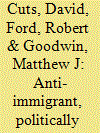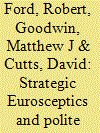|
|
|
Sort Order |
|
|
|
Items / Page
|
|
|
|
|
|
|
| Srl | Item |
| 1 |
ID:
103364


|
|
|
|
|
| Publication |
2011.
|
| Summary/Abstract |
The elections to the European Parliament (EP) held in June 2009 marked a breakthrough for the extreme right British National Party (BNP), while in other European states extreme right parties (ERPs) similarly made gains. However, the attitudinal drivers of support for the BNP and ERPs more generally remain under-researched. This article draws on unique data that allow unprecedented insight into the attitudinal profile of ERP voters in Britain - an often neglected case in the wider literature. A series of possible motivational drivers of extreme right support are separated out: racial prejudice, anti-immigrant sentiment, protest against political elites, Euroscepticism, homophobia and Islamophobia. It is found that BNP support in the 2009 EP elections was motivationally diverse, with racist hostility, xenophobia and protest voting all contributing significantly to BNP voting. The analysis suggests that the BNP, which has long been a party stigmatised by associations with racism and violent extremism, made a key breakthrough in 2009. While racist motivations remain the strongest driver of support for the party, it has also begun to win over a broader coalition of anti-immigrant and anti-elite voters.
|
|
|
|
|
|
|
|
|
|
|
|
|
|
|
|
| 2 |
ID:
111505


|
|
|
|
|
| Publication |
2012.
|
| Summary/Abstract |
While Euroscepticism is the most important driver of United Kingdom Independence Party (UKIP) support, other attitudinal drivers - namely dissatisfaction towards mainstream parties and xenophobia - are also important. Examining vote-switching between first- and second-order elections evidence is found of a distinction between two types of supporter: more affluent and middle-class 'strategic defectors' from the mainstream Conservative Party who support UKIP to register their Euroscepticism, and more economically marginal and politically disaffected 'core loyalists' who are attracted to UKIP by its anti-immigration rhetoric and populist anti-establishment strategy. UKIP also succeeds in attracting core support from groups such as women who have traditionally rejected extreme right parties such as the British National Party (BNP). This suggests that UKIP is well positioned to recruit a broader and more enduring base of support than the BNP.
|
|
|
|
|
|
|
|
|
|
|
|
|
|
|
|
| 3 |
ID:
135878


|
|
|
|
|
| Summary/Abstract |
In this article we explore the structural shifts which help explain the emergence of UKIP as a major radical-right political force in Britain. There are two distinct, but related, aspects to this story. The first is the changes to Britain's economic and social structure that have pushed to the margins a class of voters who we describe as the ‘left behind’: older, working-class, white voters with few educational qualifications. The second is long-term generational changes in the values that guide British society and shape the outlook of voters. These value shifts have also left older white working-class voters behind, as a worldview which was once seen as mainstream has become regarded as parochial and intolerant by the younger, university-educated, more socially liberal elites who define the political consensus of twenty-first-century Britain. We then move to consider the political changes that have further marginalised these voters, as first Labour and then the Conservatives focused their energies on recruiting and retaining support from middle-class, moderate swing voters. Finally, we show how UKIP has developed into an effective electoral machine which looks to win and retain the loyalties of these voters. Finally, we discuss the longer-term implications of the radical-right revolt, which has the potential to change the nature of party competition in Britain in the 2015 election and beyond.
|
|
|
|
|
|
|
|
|
|
|
|
|
|
|
|
|
|
|
|
|